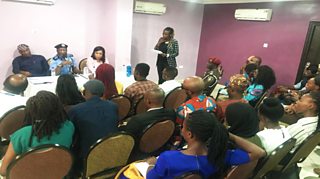Police reform: how media is addressing security reform in Nigeria
Damian Ihekoronye
Project Manager, Βι¶ΉΤΌΕΔ Media Acton Nigeria
Tagged with:
Amid the End SARS protests and political unrest sweeping many states in Nigeria, Project Manager Damian Ihekoronye describes how Βι¶ΉΤΌΕΔ Media Action Nigeria’s creative team are working to facilitate dialogue and accountability between Nigerians and their police force. Our ‘E fit happen’ series, which depicts what an ideal police force might look like and what it might take to get there, has gone viral across Nigeria, with millions of views that have sparked debate on the necessity of police reforms and accountability.
When we started the Security and Justice Reform Programme in late 2017, our formative research indicated that challenges around police reform were deep and entrenched: budgets were not transparent, security institutions were male-dominated, and human rights violations were seen as part of the job. These issues made Nigerians afraid to discuss police reform publicly, including in the media.
Many Nigerians held entrenched biases about the police, based on their negative experiences. I also had unconscious bias towards the police, due to some ugly experiences of my own and I wasn’t the only one. Many of my colleagues shared stories when we sat down for our first production meeting.
Using media to address security reform was entirely new territory, and highly sensitive. It was difficult for media organisations to talk about the accountability of uniformed men and women to Nigerian citizens.
“Police is your friend’’
This is the slogan the police here have tried to use to win the confidence and trust of the people, but it has not taken root. People just didn’t trust the police and are more likely to associate them with corruption, intimidation, brutality and bribery. Our national programming aimed to foster informed, inclusive, and constructive public discussion and dialogue to bring about change – and we knew it would be a challenge.
We started by conducting rigorous research in five focal states of Lagos, Borno, Enugu, Kano and Federal Capital Territory (FCT) – to gain insight into audiences’ perceptions, knowledge and understanding of the issues.
Our research team in Abuja found only 25% of respondents said they had confidence in police to prevent crime. A young male in rural Enugu told our researchers, “For the policemen, you have to ‘settle’ (bribe) them before they carry out operation no matter what”. And only 5% of survey participants were concerned about security issues. Socio-economic issues including poverty, unemployment and the lack of social amenities came first.
So how could our programmes address an issue that was clearly a ticking time bomb, but not a top priority for most people? Should we approach it with confrontational conversation and blame? These options felt risky and unlikely to drive positive change.
We decided to leverage our flagship Nigerian radio programmes Talk Your Own and Mu Tattauna (Let’s Discuss) because our audience research indicated that they were listened to by at least 3 of 10 research respondents across Nigeria.

We facilitated informed, inclusive and constructive dialogue for public discussions. We moderated conversations between top police officials and the public across our radio, TV and social media platforms.
We created ‘Kommando’, a visual and audio comic skit that used humour to engage with audiences about sensitive topics such as bribery or harassment of women in general by police. This popular comedy helped lessen people’s fear of discussing these problems in the media and we saw audiences begin to connect to the real issues.
Policemen and women also enjoyed the 'Kommando' skits and shared them widely amongst their colleagues. A young man in rural Borno described how he didn’t used to go to the police. “..Now I have been encouraged by the programme that I can visit the police station with my head up high and leave there the same way.”
Changing the narrative – "E fit happen"
Given the underlying public distrust towards the police, to engage Nigerians in solutions-based discussions about police reform we employed an aspirational approach to our programming.
Our focus on reform, moving away from antagonism to how things could get better was a novel way of approaching security reform in the Nigerian media.
We launched our "E fit happen" multimedia series also known as "Yana cya Yiwuw" in Hausa language. "E fit happen" is both a question (Can it happen?) and a belief (It can happen).
The "E fit happen" TV and radio public service announcements (PSAs) challenged citizens to envision the kind of police they wanted and to engage authorities in constructive dialogue, discussions, and conversations from an informed position. The media content showed that accountability, proper funding, public trust and training are all needed to achieve the desired police force.
Our combined radio, TV and online content reached approximately 5.8 million across the project focal states of Lagos, Enugu, Kano, Borno and FCT. And the high performing online content reached 2.2 million Facebook users across our two language handles - and .
Demands for action
Exactly two years since we launched this series, thousands of people have taken to the streets in Nigeria in the #EndSARS protests against police brutality, in a dramatic call for change.
I’ve seen the E Fit Happen videos go viral, with many shares, likes and millions of views sparking debate on the necessity of police reform. Despite the turmoil witnessed during the End SARs protests, at Βι¶ΉΤΌΕΔ Media Action we look forward to the opportunity to continue to bring Nigerians and duty bearers within the security services together to continue to engage in constructive solutions-based discussions on police reform in Nigeria.
--
Damian Ihekoronye
Project Manager, Security & Justice Reform Programme (SJRP)
The project has been delivering national programming across Nigeria to foster informed, inclusive, and constructive public discussion and dialogue around security and justice reform. The project has been supported by the Foreign and Commonwealth Office (FCO) of the British High Commission since December 2017.
